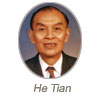AWARDEE OF TECHNOLOGICAL SCIENCES PRIZE
YUAN QUAN
Abstract
Yuan Quan, a specialist in chemical engineering, was born in November 1934 in Shanghai, China. After completing his undergraduate study in chemical engineering at Zhejiang University in 1956, he started his graduate study in chemical engineering at the Institute of Chemical Physics the following year and graduated in 1960. In 1991, he was elected the academician of the Chinese Academy of Sciences (CAS). He also served as the Director of Dalian Institute of Chemical Physics (DICP), CAS between 1990 and 1994. He is currently a research professor at DICP, CAS, an adjunct professor at Zhejiang University and Beijing University of Chemical Technology, Vice-Chair of the Academic Committee of State Key Laboratory on Chemical Engineering, and Chair of the Academic Committee of Multi-phase Reaction Laboratory.
Prof. Yuan's main research interests are: separation, reaction engineering and applied catalysis in chemical engineering. He developed a high performance rectification column for the concentration of heavy water and invented the technology to recovery deuterium from liquid ammonia in 1960s. He lead a research group of about 100 people in developing a fuel cell system for space usage in 1970s. Later, after focusing his work on membrane science and technology and catalyst design, Prof. Yuan has undertaken extensive research in organic/inorganic composite membrane, Pd/ceramic membrane and the development of membrane reactor for the production of 6-amino penicillic acid from penicillin. He is an expert in the area of activity, selectivity and yield of the catalyst pellet with non-uniform activity distribution, and together with his research group, invented a novel method for the preparation of non-uniform distribution catalyst. Based on that, more than ten new processes have been developed, such as town gas production by methanation of water gas, hydrogenation of alkynes, removal of oxygen in high concentration CO, etc. A good desulfurer with 60% sulfur content for removal of H2S has been contrived based on the understanding of three-phases mass transfer in porous media. He has been successful in conducting multidisciplinary studies combining environment, energy sources and biomedical material research with chemical engineering. A study on micro-chemical technology is currently in progress.
Prof. Yuan has received 15 major awards for his work, including a National Natural Science Prize (3rd class) in 1987, a CAS Scientific and Technological Progress Prize (1st class) in 1989, a National Technological Invention Prize (3rd class) in 1996, and most recently, a National Technological Invention Prize (2nd class) in 2001.






